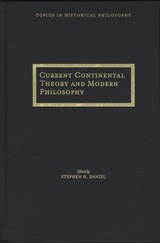
What claims does the early modern period have on contemporary philosophy? How have recent theorists engaged this material, and why? In answer, some of these essays explore how major Continental theorists such as Derrida, Deleuze, Le Doeuff, Irigaray, Kristeva, and Althusser explicate the ideas of classical modern thinkers; others draw on recent Continental insights to examine the doctrines of modern philosophers beginning with Machiavelli and ending with Kant. Together they show how current Continental theory reinvigorates the study of the history of modern philosophers by transforming not only how we interpret their answers to certain questions, but also how we understand the very nature of these questions.
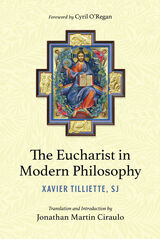
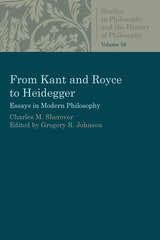
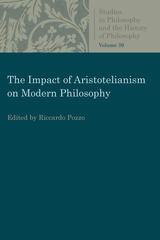

In a sense it would be inappropriate to speak of “Hegel’s system of philosophy,” because Hegel thought that in the strict sense there is only one system of philosophy evolving in the Western world. In Hegel’s view, although at times philosophy’s history seems to be a chaotic series of crisscrossing interpretations of meanings and values, with no consensus, there has been a teleological development and consistent progress in philosophy and philosophizing from the beginning; Hegel held that his own version of “German idealism” was simply bringing to final expression the latest refinements of an ongoing, perennial system.
If we take Hegel at his word, then one of the best entries into his system would be through the history of philosophy, showing how systems and schools of thought prior to Hegel led up to his system. The most important currents to focus on, however, would be in modern philosophy, in which especially intensive changes led ultimately to German idealism and Hegel’s immediate predecessors.
Fortunately, Hegel lectured extensively on the history of modern philosophy and structured his lectures in such a way as to throw light on the status of the “one system” of Western philosophy at the time — the status to which Hegel felt he had been contributing and was continuing to contribute. These lectures are of interest, first of all, as a systematic chronicle of philosophical positions in the heyday of modern philosophy, from Bacon to Hegel. Second, they are interesting because Hegel’s critical comments on his predecessors clarify his own positions: for example, the dialectic method and the importance of triplicity, the relationship of philosophy to the scientific method, the necessity for avoidance of the extremes of empiricism and of idealism, the subject/object problematic, the “identity” of rationality and reality, and the technical meaning in Hegel’s philosophy of “absolute,” “infinity,” and the “idea.”
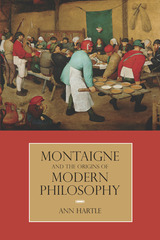
Montaigne’s Essays are rightfully studied as giving birth to the literary form of that name. Ann Hartle’s Montaigne and the Origins of Modern Philosophy argues that the essay is actually the perfect expression of Montaigne as what he called "a new figure: an unpremeditated and accidental philosopher." Unpremeditated philosophy is philosophy made sociable—brought down from the heavens to the street, where it might be engaged in by a wider audience. In the same philosophical act, Montaigne both transforms philosophy and invents "society," a distinctly modern form of association. Through this transformation, a new, modern character emerges: the individual, who is neither master nor slave and who possesses the new virtues of integrity and generosity. In Montaigne’s radically new philosophical project, Hartle finds intimations of both modern epistemology and modern political philosophy.

In his previous book, Doubt, Time, Violence, Hoffman explored the theme of violence in relation to Descartes' problematic of doubt and Heidegger's work on temporality. The pivotal notion deriving from that investigation is the notion of the other as the ultimate limit of one's powers. In effect, Hoffman argues, our practical mastery of the natural environment still leaves intact the limitation of human agents by each other. In a violent environment, the other emerges as an insurmountable obstacle to one's aims and purposes or as an inescapable danger which one is powerless to hold at bay. The other is thus the focus of an ultimate resistance to one's powers.
The special status of the other, as Hoffman articulates it, is at the root of several key notions around which modern philosophy has built its problematic. Arguing here that when the theme of violence is taken into account many conceptual tensions and puzzles receive satisfying solutions, Hoffman traces the theme through the issue of things versus properties; through Kant's treatment of causality, necessity, and freedom in the Critique of Pure Reason; and through the early parts of Hegel's Logic. The result is a complete reorientation and reinterpretation of these important texts.
Violence in Modern Philosophy offers patient and careful textual clarification in light of Hoffman's central thesis regarding the other as ultimate limit. With a high level of originality, he shows that the theme of violence is the hidden impulse behind much of modern philosophy. Hoffman's unique stress on the constitutive importance of violence also offers a challenge to the dominant "compatibilist" tradition in moral and political theory. Of great interest to all philosophers, this work will also provide fresh insights to anthropologists and all those in the social sciences and humanities who occupy themselves with the general theory of culture.
READERS
Browse our collection.
PUBLISHERS
See BiblioVault's publisher services.
STUDENT SERVICES
Files for college accessibility offices.
UChicago Accessibility Resources
home | accessibility | search | about | contact us
BiblioVault ® 2001 - 2025
The University of Chicago Press









